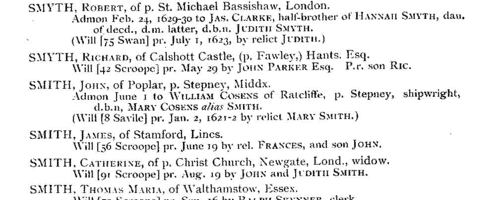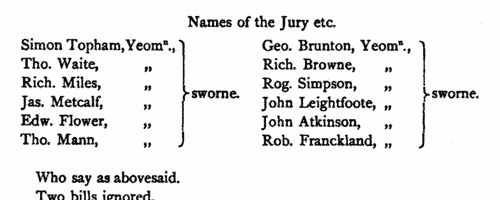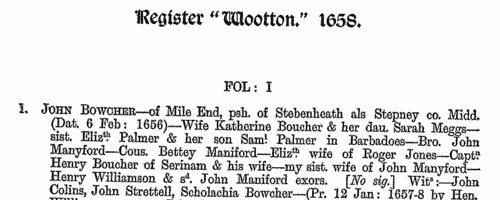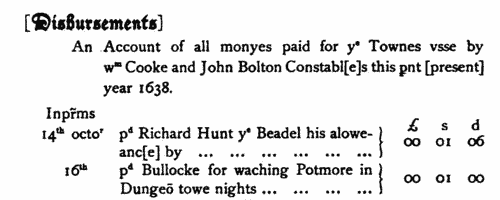Battersby Surname Ancestry ResultsOur indexes 1000-1999 include entries for the spelling 'battersby'. In the period you have requested, we have the following 416 records (displaying 11 to 20): Single Surname Subscription | | | Buying all 416 results of this search individually would cost £2,272.00. But you can have free access to all 416 records for a year, to view, to save and print, for £100. Save £2,172.00. More... |
These sample scans are from the original record. You will get scans of the full pages or articles where the surname you searched for has been found. Your web browser may prevent the sample windows from opening; in this case please change your browser settings to allow pop-up windows from this site. Intended Brides in Yorkshire
(1627)
William Paver, a 19th-century Yorkshire genealogist, made brief abstracts of early marriage licences (now lost) in York Registry. His manuscript, which became Additional Manuscripts 29667 in the British Museum, was transcribed by J. W. Clay, F. S. A., and printed in various issues of the Yorkshire Archaeological Journal: this is from the volume for 1903. Paver did not note the dates of the licences, merely listing them by year: his abstracts give the names and addresses of both parties, and the name of the parish church in which it was intended that the wedding would take place.BATTERSBY. Cost: £4.00.  | Sample scan, click to enlarge

| Lancashire and Cheshire Marriage Licences
(1624-1632)
Licences for intended marriages in Chester archdeaconry, which covered Cheshire and Lancashire south of the Ribble (by far the most populous part of that county)BATTERSBY. Cost: £4.00.  | Sample scan, click to enlarge

| PCC Probates and Administrations
(1634)
The Prerogative Court of Canterbury's main jurisdiction was central and southern England and Wales, as well as over sailors &c dying abroad: these brief abstracts, compiled under the title "Year Books of Probates", and printed in 1902, usually give address, date of probate and name of executor or administrator. They are based on the Probate Act Books, cross-checked with the original wills, from which additional details are, occasionally, added. The original spelling of surnames was retained, but christian and place names have been modernised where necessary.BATTERSBY. Cost: £2.00.  | Sample scan, click to enlarge

| Lancashire and Cheshire Marriage Licences
(1639-1644)
Licences for intended marriages in Chester archdeaconry, which covered Cheshire and Lancashire south of the Ribble (by far the most populous part of that county)BATTERSBY. Cost: £4.00.  | Sample scan, click to enlarge

| PCC Probate Abstracts
(1650-1651)
The Prerogative Court of Canterbury's main jurisdiction was central and southern England and Wales, as well as over sailors &c dying abroad: these brief abstracts usually give address, date of probate and name of executor or administrator
BATTERSBY. Cost: £2.00.  | Sample scan, click to enlarge

| Quarter Sessions for the North Riding of Yorkshire
(1647-1658)
The Quarter Sessions minute books for the North Riding from October 1647 to January 1658 were edited by the Rev. J. C. Atkinson for the North Riding Record Society and published in 1887. These are abstracts of sessional orders, minutes of criminal cases, memoranda and other entries of record concerning the administration of the riding. BATTERSBY. Cost: £4.00.  | Sample scan, click to enlarge

| Prerogative Court of Canterbury Wills: Lincolnshire: Testators
(1658)
William Brigg compiled abstracts of all the wills in Register "Wootton" of the Prerogative Court of Canterbury. The abstracts of those proved in 1658 were published by him in 1894. The court's main jurisdiction was central and southern England and Wales, as well as over sailors &c dying abroad. We have re-indexed the whole volume, county by county, for both testators and strays (legatees, witnesses and other persons mentioned in the abstracts). BATTERSBY. Cost: £4.00.  | Sample scan, click to enlarge

| Royalist delinquents in county Durham and Northumberland, their successors, tenants, debtors and creditors
(1648-1660)
King Charles I was executed 30 January 1649, the kingship was abolished and government by a Council of State was established 14 February 1649. Oliver Cromwell became Lord Protector 16 December 1653; died 3 September 1658; and was succeeded by his son Richard, who abdicated 24 May 1659. Charles II was established on the throne 29 May 1660. From 1648 to 1660 parliament sequestrated royalists' estates, restoring many by a process of heavy fines called compounding; this was administered by the Committee for Compounding, working through county committees. These raised considerable amounts of money, money which was vitally necessary for maintaining the parliamentary army's campaigns to subdue opposition in the three kingdoms - England, Scotland and Ireland. The raising and delivery of these monies was the responsibility of the Committee for Advance of Money (C. A. M.). The records of these committees were detailed and extensive, amounting to about 300 volumes, and were calendared for the Public Record Office by Mary Anne Everett Green. Abstracts of the county Durham and Northumberland entries were collated by Richard Welford with a manuscript transcript of the proceedings of the parliamentary commissioners in county Durham surviving in Durham cathedral library, and published by the Surtees Society in 1905. The persons named in these abstracts are not only the delinquents themselves, and those who succeeded them in their estates, but tenants, debtors and creditors, and local constables and officials of the committees.BATTERSBY. Cost: £4.00.  | Sample scan, click to enlarge

| Inhabitants of Manchester, and travellers
(1633-1666)
The constables' accounts of the manor of Manchester in Lancashire from 1633 to 1647 were edited by J. P. Earwaker and published in 1892. The accounts largely consist of details of disbursements by the constables, and as such include payments to paupers and soldiers with passes to help them on their journeys to and from other parts of the country. Earwaker added nine 'important appendices' to the work: 1. Disbursements and Receipts during the Plague of Manchester, 1605-6 and 1606 (from State Papers Domestic in the Public Record Office); 2. List of the Books of Assessment, Charity Money Accounts, &c., now in the Possession of the Corporation; 3. List of the Inhabitants of Manchester in 1648 (pages 181 to 201); 4. List of the Inhabitants of Manchester in 1651 (202-221); 5. Disbursements of the Constables in 1651-2; 6. List of the Inhabitants of Manchester assessed in 1659 (225-246); 7. A Second List of the Inhabitants of Manchester in 1659 (247-260); 8. List of the Inhabitants of Manchester assessed in 1666 (261-283); and 9. List of Uncommon, Obsolete, and Dialect Words to be found in the Preceding Pages.BATTERSBY. Cost: £4.00.  | Sample scan, click to enlarge

| Allegations for marriages in southern England
(1669-1679)
The province or archbishopric of Canterbury covered all England and Wales except for the northern counties in the four dioceses of the archbishopric of York (York, Durham, Chester and Carlisle). Marriage licences were generally issued by the local dioceses, but above them was the jurisdiction of the archbishop, exercised through his vicar-general. Where the prospective bride and groom were from different dioceses it would be expected that they obtain a licence from the archbishop; in practice, the archbishop residing at Lambeth, and the actual offices of the province being in London, which was itself split into myriad ecclesiastical jurisdictions, and spilled into adjoining dioceses, this facility was particularly resorted to by couples from London and the home counties, although there are quite a few entries referring to parties from further afield. The abstracts of the allegations given here usually state name, address (street in London, or parish), age, and condition of bride and groom; and sometimes the name, address and occupation of the friend or relative filing the occupation. Where parental consent was necessary, a mother's or father's name may be given. The ages shown should be treated with caution; ages above 21 tended to be reduced, doubtless for cosmetic reasons; ages under 21 tended to be increased, particularly to avoid requiring parental consent; a simple statement 'aged 21' may merely mean 'of full age' and indicate any age from 21 upwards. These are merely allegations to obtain licences; although nearly all will have resulted in the issuing of the licence, many licences did not then result in marriage. BATTERSBY. Cost: £4.00.  | Sample scan, click to enlarge

|
Research your ancestry, family history, genealogy and one-name study by direct access to original records and archives indexed by surname.
|












